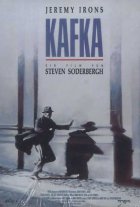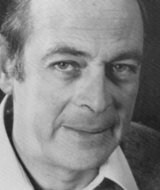
Kafka Page #3
- PG-13
- Year:
- 1991
- 98 min
- 697 Views
KAFKA:
Well -- nice to know life exists
outside the office.
GABRIELA:
(ironic)
Yes.
Kafka nods goodbye and walks away, berating himself for
banality.
CUT:
OUTSIDE - NIGHT
Kafka resists going along with the others.
KAFKA:
No, really, I have to go home too.
MARGARETE:
We're keeping him from his true
vocation.
JULIUS:
I know, he consists of writing.
We wouldn't be his friends if we
didn't threaten his solitude!
Julius is a little drunk. The others help him with his coat.
ANNA:
Has a private moment with Kafka.
ANNA:
Where do you live?
KAFKA:
Up there.
He gestures in the direction of the River, and the castle
that looms on a far hill beyond, huge and brooding, regally
dominating the city.
ANNA:
I tried finding a place on Castle
Hill when I arrived. I wanted to
share the majesty.
(The majesty of marriage is what he fears she represents.
This innocent scene could very well be a subjective
Kafkaesque nightmare as sinister in its own way as any of the
more outright horrific scenes to come.)
KAFKA:
It's only majestic from here.
When you get closer you see it
for what it really is.
ANNA:
What is it really?
KAFKA:
A glorified office block. They
keep all the old records there --
the final resting place for facts
and figures that have ceased to
matter in the world of the living.
ANNA:
Well, as long as I admire it from
afar it shouldn't worry me if it's
hollow.
(The castle of marriage tempts him -- but would suffocate
him.)
KAFKA:
It's more than hollow. It's
stillborn. For all its size it
serves no purpose. It's just
there -- like death -- hovering
over a breathing city.
THE OTHERS:
Turn back into the picture. Margarete pats Kafka
sympathetically.
MARGARETE:
Don't worry about your friend --
I'm sure he'll turn up.
ERNST:
(a parting word)
What are you working on, Kafka?
KAFKA:
I'm writing a story about a man
who wakes up one morning to find
himself transformed into a giant
insect.
His friends glance at each other surreptitiously and don't
know what to say -- other than goodnight
KAFKA:
Turns to go -- when he notices Bizzlebek leaning listlessly
in the coffee house doorway. A figure in the shadows.
BIZZLEBEK:
I've read your stories. They're
fantastic.
KAFKA:
(not sure if he
believes him)
I don't know what you could have
read.
BIZZLEBEK:
Just what you've published.
KAFKA:
BIZZLEBEK:
I read the one about the penal
colony.
KAFKA:
(cautious)
Did you?
BIZZLEBEK:
The needles inscribing the
judgement into the flesh of the
man.
(looks impressed)
Very good.
Kafka suspects he's being mocked. But perhaps not.
Bizzlebek steps out, buttoning his coat.
BIZZLEBEK:
If I could sculpt as well as that,
He's already quite proud of himself -- tossing his scarf over
his shoulder with a flourish -- and striding off into the
night.
CUT:
THE CASTLE - NIGHT
Seen from just below, from the ancient cemetery that borders
its high, impregnable, imperial walls. The all-seeing-eye of
the city. An awesome edifice.
Kafka walking across from the Old Quarter toward the New
Town.
He passes some working-class types who seem vaguely
threatening. Do they mutter some remark behind his back?
CUT:
ALCHEMISTS' ROW - NIGHT
A bizarre street. Tiny little houses that look fashioned by
a toymaker, all bunched tightly next to each other, forming a
continuous rooftop of odd configurations and angles and
pointed chimneys. The street named after practitioners of
the black arts and dark sciences who inhabited it in the
Sixteenth Century.
Kafka's house is toward the back, a light shining from the
single upper window. Through it, Kafka is seen sitting at
the only desk that really matters to him -- his writing one.
KAFKA'S ROOM
He's struggling to get a sentence right -- rereading it to
himself.
KAFKA:
morning from disturbing dreams
he ... from unsettling dreams ...
uneasy dreams ... Gregor Samsa ...
Gregor ...?"
(wondering)
Carl. George. Rudolf ...
Suddenly there's a loud KNOCK on the front door below.
DOWNSTAIRS:
Kafka opens the tiny front door of this almost-miniature
little house. Two intimidating MEN stand outside, one tall,
one short, wearing similar black suits and grim expressions.
CUT:
ANOTHER DOOR - NIGHT
Kafka tries to match the exacting pace of his two warders,
flanking him as they walk him along a corridor, through
another doorway.
MORGUE:
Kafka tugs his collar up a bit, his breath visible in the
air. He has a feeling what's going to be under the sheet on
the lonely trolley in the middle of the room before the first
man summons him over to it.
Kafka goes. The first man yanks the sheet off the face in
one quick movement. The face of Eduard. White and bloated,
the tongue jutting, the eyes bulging.
Kafka recoils, stepping back instinctively.
SECOND MAN:
(still behind Kafka
at the door)
You know him?
KAFKA:
... Yes.
FIRST MAN:
His name is Eduard Raban?
KAFKA:
... Yes.
And now he hears a stirring in a dark corner. He looks up
again.
A third man steps out of the shadows where he's been quietly
standing and walks over to Kafka. He is a severe man,
stolid, dedicated, and never smiles. He reminds Kafka of his
father.
MAN:
(with an introductory
nod)
Inspector Grubach.
CUT:
INSPECTOR'S OFFICE - NIGHT
The Inspector behind his big desk. Kafka in front of it.
INSPECTOR:
Kafka -- is that your real name?
KAFKA:
Yes. Yes, of course -- why
wouldn't it be?
INSPECTOR:
When was the last time you saw
Mr. Raban?
KAFKA:
Wednesday. We left the office
together.
INSPECTOR:
Did you go anywhere afterwards --
to have a drink perhaps?
KAFKA:
No, we said goodbye outside the
building. He went off, as usual,
toward his house.
INSPECTOR:
(consulting papers)
Your office is the Workmen's --
KAFKA:
-- Accident and Compensation
Association.
INSPECTOR:
Where you've been employed for
seven years.
KAFKA:
Eight -- and seven months.
INSPECTOR:
Engaged in the manufacture and
distribution of ... pills and so
forth.
KAFKA:
Well -- other departments are, yes.
INSPECTOR:
Would you describe your relationship
with the dead man as close?
KAFKA:
Yes. Since he came to the office,
been quite good friends.
(pause)
How was Eduard ...
INSPECTOR:
He was found in the River. Could
he swim?
KAFKA:
I don't know.
INSPECTOR:
Was he depressed?
KAFKA:
No. He didn't seem to be. Do
INSPECTOR:
Grown men don't normally fall
into the river, do they?
KAFKA:
No, I suppose not.
INSPECTOR:
(closing the file)
He might have had a drink or two,
despite what you think.
KAFKA:
(as the interview
seems to be over)
Can I ask -- how you found me?
INSPECTOR:
His landlady knew of no other
friends to refer us to.
KAFKA:
I don't think he really had any.
He had no family either.
INSPECTOR:
We know that.
Pause.
KAFKA:
He wasn't a lonely man, though.
INSPECTOR:
Translation
Translate and read this script in other languages:
Select another language:
- - Select -
- 简体中文 (Chinese - Simplified)
- 繁體中文 (Chinese - Traditional)
- Español (Spanish)
- Esperanto (Esperanto)
- 日本語 (Japanese)
- Português (Portuguese)
- Deutsch (German)
- العربية (Arabic)
- Français (French)
- Русский (Russian)
- ಕನ್ನಡ (Kannada)
- 한국어 (Korean)
- עברית (Hebrew)
- Gaeilge (Irish)
- Українська (Ukrainian)
- اردو (Urdu)
- Magyar (Hungarian)
- मानक हिन्दी (Hindi)
- Indonesia (Indonesian)
- Italiano (Italian)
- தமிழ் (Tamil)
- Türkçe (Turkish)
- తెలుగు (Telugu)
- ภาษาไทย (Thai)
- Tiếng Việt (Vietnamese)
- Čeština (Czech)
- Polski (Polish)
- Bahasa Indonesia (Indonesian)
- Românește (Romanian)
- Nederlands (Dutch)
- Ελληνικά (Greek)
- Latinum (Latin)
- Svenska (Swedish)
- Dansk (Danish)
- Suomi (Finnish)
- فارسی (Persian)
- ייִדיש (Yiddish)
- հայերեն (Armenian)
- Norsk (Norwegian)
- English (English)
Citation
Use the citation below to add this screenplay to your bibliography:
Style:MLAChicagoAPA
"Kafka" Scripts.com. STANDS4 LLC, 2024. Web. 22 Nov. 2024. <https://www.scripts.com/script/kafka_883>.



Discuss this script with the community:
Report Comment
We're doing our best to make sure our content is useful, accurate and safe.
If by any chance you spot an inappropriate comment while navigating through our website please use this form to let us know, and we'll take care of it shortly.
Attachment
You need to be logged in to favorite.
Log In